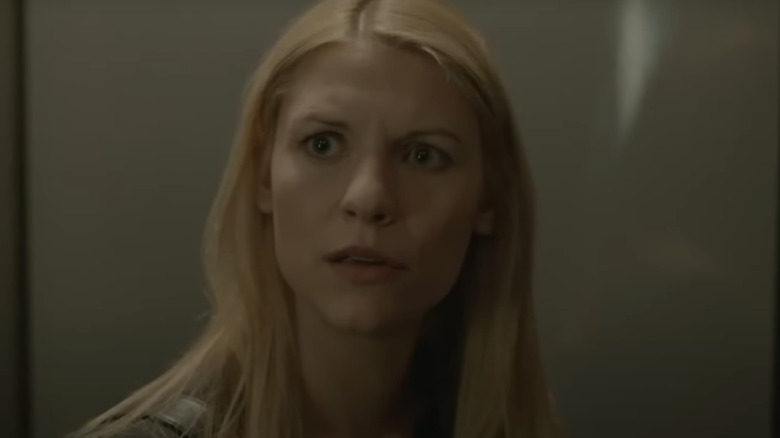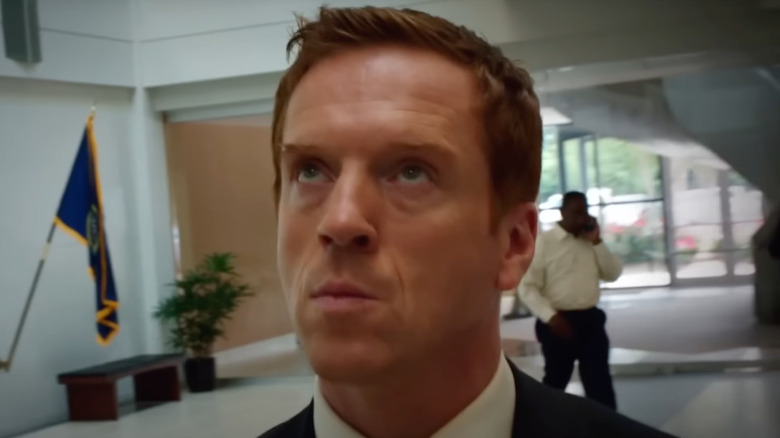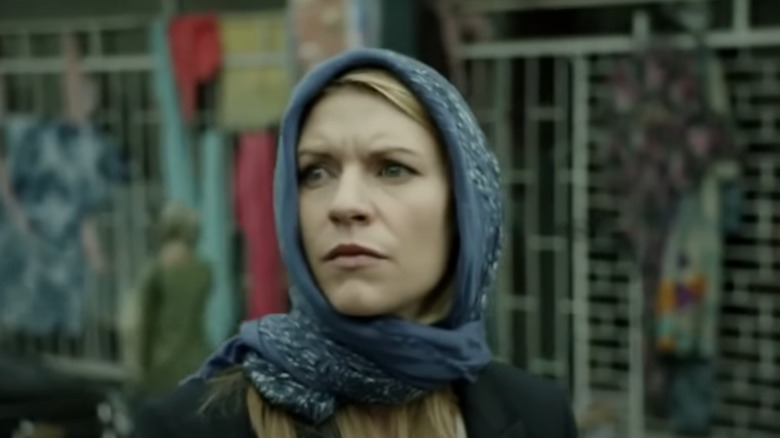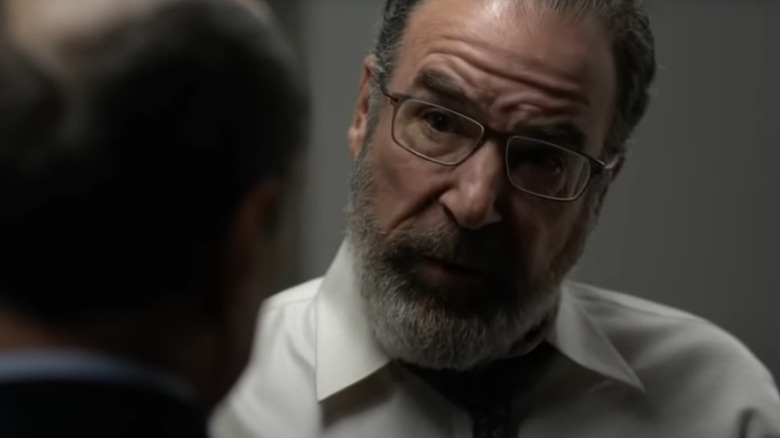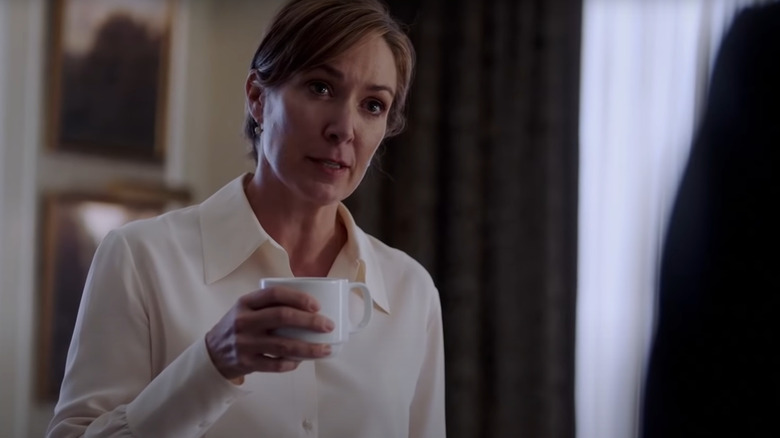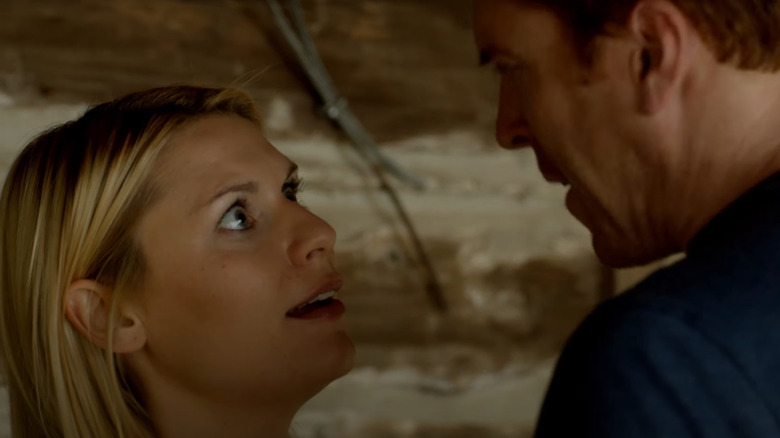Every Season Of Homeland Ranked Worst To Best
Starring Claire Danes, Damian Lewis, Mandy Patinkin, Rupert Friend, and Morena Baccarin, "Homeland" follows the life of Marine Sgt. Nicholas Brody (Lewis) after a near-decade-long stint in captivity. He immediately falls under the scrutiny of resourceful (and bipolar) CIA agent Carrie Mathison (Danes). She believes he's become a terrorist. So begins a cat-and-mouse thriller filled with numerous twists and shocking moments.
Throughout its eight seasons, "Homeland" took its viewers on a wild emotional ride. After winning several awards amidst its premiere season in 2011, the spy series stumbled to live up to its hype. Eventually, showrunners Alex Gansa and Howard Gordon (of "X-Files" and "24" fame) shifted "Homeland" into a brilliant new direction — carrying the show to a satisfying finale.
So, which season is the best that "Homeland" has to offer? Pop in some jazz music, grab a big bottle of wine, and read on to see every season of "Homeland" ranked worst to best.
8. Season 3
Season 3 of "Homeland" struggles to find solid footing, clumsily bouncing between an espionage thriller series and a trite family drama. Aside from Brody's heart-wrenching sendoff in the final episode, the third outing crumbles under silly plot twists and far too much Dana Brody (Morgan Saylor) nuttiness. Still, Carrie is as effective as ever — even when offering herself as a sacrifice to aid Saul's complex agenda. The ludicrous bait and switches sometimes feel more akin to "24" than peak "Homeland," as its shocking moments arrive too fast without rhyme or reason.
Of course, the problem lies in Brody. He spends far too much time off-screen and deprives us of the delicious Danes-Lewis chemistry until the final few episodes. Really, Brody should have died at the end of the first season and allowed the series (and Carrie) to head in a new direction. As constructed, season 3 feels stuck in second gear, afraid to let go of the past and unsure what to do with its dangling plot threads. Thankfully, episodes 10-12 end the season on a solid note and finally give Brody the redemption he longed to find. He's a terrific character but his presence hindered Carrie and the show. So when he gives himself up to the hangman's noose, it feels like a proper finale to a long-winded storyline. This move allowed "Homeland" to find new life.
7. Season 2
How do you follow up on one of the most acclaimed debut seasons in TV show history? The Emmy-winning season 1 was an emotionally resonant tour de force of acting, writing, and direction. Season 2 quadrupled down on everything that worked! Season 2 isn't terrible. The season starts well and ends on an appropriately explosive note, setting the stage for an intriguing third act. Unfortunately, numerous subplots — Dana's hit-and-run accident, for example — fail to resonate. The middle episodes feel more like padding than necessary chapters in a tightly wound story.
Also, there are so many plot contrivances! Resident villain Abu Nazir (Navid Negahban) turns into a literal boogieman capable of popping up wherever the plot needs him before dying in the most lackluster way imaginable. There's also a bit where Brody must assassinate the Vice President of the United States, which raises far too many questions. Where are the secret service agents? Why was no one shadowing Brody? Why does no one suspect Brody? Why is no one protecting Carrie?
Negatives aside, the early episodes intensely explore Carrie and Brody's complicated dynamic. There's a terrific scene where she cleverly forces him into submission through carefully worded dialogue. The series wisely hones in on this odd pairing in its waning moments, which is good because Danes and Lewis are great scene partners. Still, the overall season is disappointing.
6. Season 4
With Brody out of the picture, "Homeland" gets back to business! Season 4 marks a brilliant return to form for the series. While grieving the loss of her love and avoiding motherhood, Carrie ventures back into the field to continue her job as a ruthless killer, aka the "Drone Queen." She orders the execution of a high-ranking terrorist during a very public wedding. Naturally, this causes problems — like Carrie sleeping with an asset to further the mission, nearly killing Saul, and forming a powerful allegiance with the show's most bada** character, Peter Quinn (Rupert Friend).
Rather than try to top the explosive finales of its previous three seasons, the "Homeland" season 4 finale is far more sinister. After returning to duty, Saul betrays Carrie in a smartly written finale. Yes, a few silly plot twists occur. But season 4 jettisons the fat — i.e., Dana and the Brodys — to deliver a crowd-pleasing and hard-hitting spy thriller. By now, Danes is a pro at displaying Carrie's neurotic nature. In an early scene, Carrie nearly kills her baby: It's gut-wrenching but the final shot of her distraught face perfect sums up her journey thus far.
5. Season 5
Whether or not you appreciate "Homeland" season 5 depends on what you expect the show to be. Those yearning for the sophistication and intelligence found in season 1 will be left wanting, as this 12-episode arc has enough eye-rolling plot twists to cause a migraine. However, if you appreciate "Homeland" as a fun spy thriller and live for out-of-the-blue story developments, then season 5 delivers everything you'd desire.
Season 5 functions as a soft reboot of the series, jumping the series' timeline ahead by two years. Carrie lives a quiet domesticated life. Predictably, she gets dragged back into the action, leading to plentiful bouts of wine drinking and sobbing. Our bipolar character works best when she's teetering on edge, so we welcome her return to the CIA while acknowledging the psychological ramifications of her work. Carrie's dilemma is what makes this series so exciting and interesting. (Still, I'm always wondering if there aren't better operatives for Saul to hire?)
Ultimately, what raises season 5 above other seasons is the inclusion of Miranda Otto's villainous and formidable Allison Carr. While her demise is somewhat anti-climatic, the show has fun presenting her as Carrie's evil alter ego. Aside from a few early bland episodes, Quinn takes center stage and enjoys a dramatic and fitting sendoff. (Weirdly, the producers brought him back to die another day in season 6. Damn you, fan service!)
4. Season 7
"Homeland" season 7 keeps its thumb on modern-day political issues and ends with a dash of hope — even if Carrie ends the season broken, childless, and alone. She gave everything she had to her country. Still, the psychological toll enacted might be irreversible.
The series bumpy trajectory finally resulted in a satisfying concoction here, becoming a timely spy thriller that dared to point its finger at its audience. The stirring season finale speech given by President Keane (Elizabeth Marvel) is a message we can all strive to follow — be better. No matter what you may think of the awkward storytelling mechanics, "Homeland" deserves kudos for at least trying (and mostly succeeding) as a culturally and politically relevant dramatization of our world. Carrie, a fundamentally flawed but ultimately devoted patriot, stands as the story's hero. She makes rash decisions and runs before she can walk. Still, Carrie desperately wants what's best for the world, so much so that she sacrifices her mind and soul for the greater good.
Some viewers may balk at the preachy sentiment. Others will embrace "Homeland" for what it is — a wily thriller with meaningful heft. The penultimate session is just what the doctor ordered.
3. Season 6
If season 4 felt like a new start for "Homeland," then Season 6 is the breath of fresh air fans clamored for since its brilliant first season. Devoid of unnecessary fat, season 4's plot focuses on real-life political issues, covering everything from fake news to a military coup. The stakes here feel more substantial and relevant. Sure, things still go boom — a lot! — and several head-scratching beats push the plot uneasily along. Still, this season is perhaps the most balanced "Homeland" entry yet, combining action with powerful character moments.
Now, I had my qualms about seeing Peter Quinn again. He survives an endless — and ridiculous — amount of shootouts, explosions, and beatings. Quinn stumbles through this season as a broken man bereft of purpose. His near-death experience left him physically altered and angry, a harrowing development for such a beloved character. Luckily, the man goes out with a bang — saving the President of the United States and Carrie from certain death. He gets one of those voice-over monologues Hollywood loves to cook up to end his arc fittingly.
Other positives of season 6: Carrie's strained relationship with Saul, Dar Adal morphing into a character we root for, and learning that the President-elect might not be the best person for the job. Great stuff!
2. Season 8
Fittingly, "Homeland" ends its run on the smiling faces of Carrie and Saul. Carrie defects to Russia, where she writes a book titled "Tyranny of Secrets: Why I Had to Betray My Country." She sends Saul, her on-again-off-again mentor/father figure, an early copy. It takes mere minutes for Saul to find a hidden message tucked in the book's spine, revealing important Russian intelligence. Saul grins. We cut to Carrie in Russia, content with her new life as a double agent. After everything, it turns out Carrie is the happiest when living a lie — a proper conclusion for the character.
Likewise, Saul keeps sight of his core beliefs — even with millions of lives at stake and inevitable nuclear war. Our heroes always had differing views on tackling issues. Still, a combination of their opposing points of view eventually saves the day. This is the only way the series could end.
"Homeland" often struggled to reconcile its objective with fan expectations. The unique relationship between Brody and Carrie initially drew us to the show. After a few bumpy years, the series morphed into a commentary on modern-day society. Season 8 may not be the best of the lot, but it provides a solid bit of closure for America's favorite dysfunctional spy family.
1. Season 1
Every "Homeland" season offers something unique to viewers. Still, it's hard to outdo the original. Novel, thrilling, and complex, season 1 kicked the series off with a bang. "Homeland" gave us flawed and fascinating characters with a slow-burn plot that built to a satisfying climax. Had "Homeland" tapped out after one season, critics would have hailed it as a great mini-series.
While other seasons may top the inaugural 12 episodes in terms of sheer explosiveness and twists, the freshness of seeing our girl Carrie and her pal Saul piece together the mystery surrounding U.S. war hero Brody is hard to top. Sure, some of the plot beats are contrived — Abu Nazir somehow knows Brody will get selected for Congress immediately following a bombing? Yes, the strained relationship between Carrie and Brody gets tiresome. But overall, there's not much to frown upon in this batch of episodes. Brody kills a deer. Carrie learns the art of interrogation and blackmail. Saul discovers the frivolities of his job, and everyone realizes that the United States isn't opposed to doing awful things to get the job done.
Ultimately, Brody's journey serves as the heart of the premiere season. His actions stem from a place of pain, making him a villain we sympathize with and fear all at once. It's weird to root for and against a villain simultaneously, but that's just one of the many aspects that make season 1 the reigning champ.

